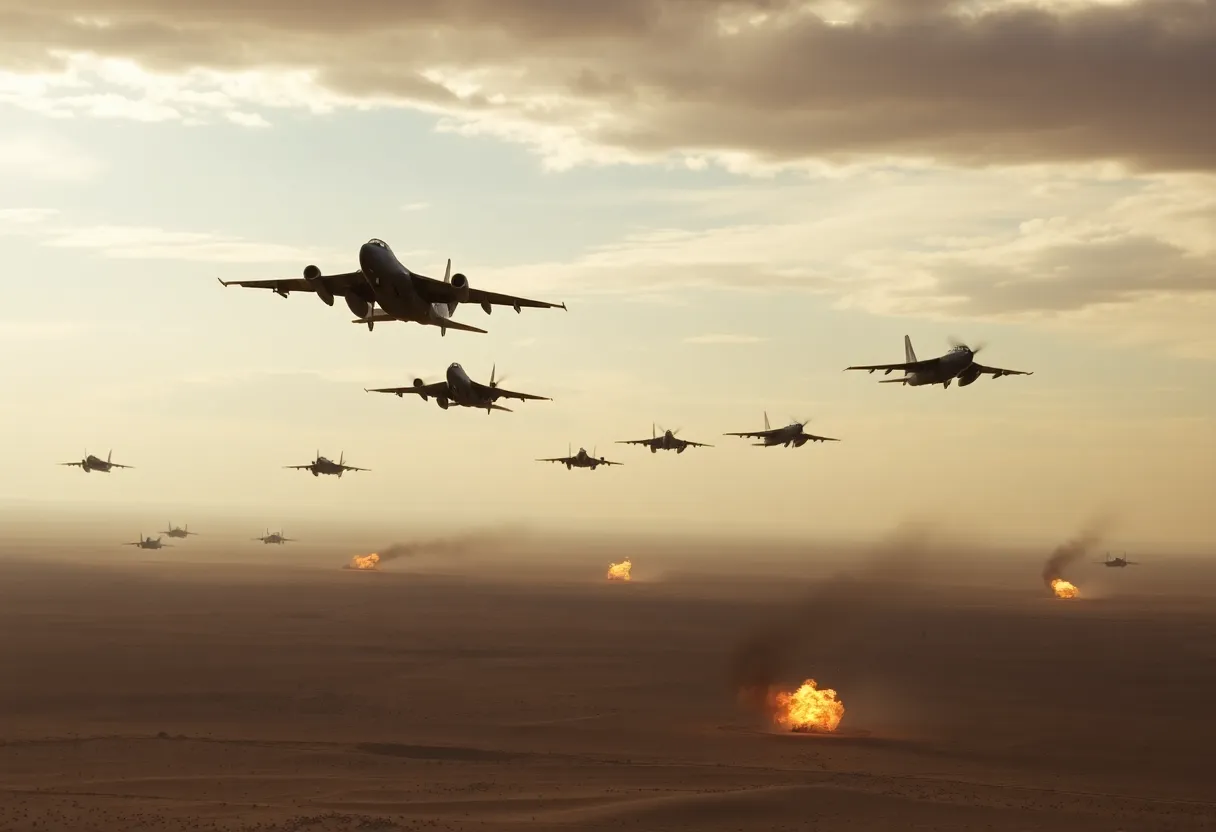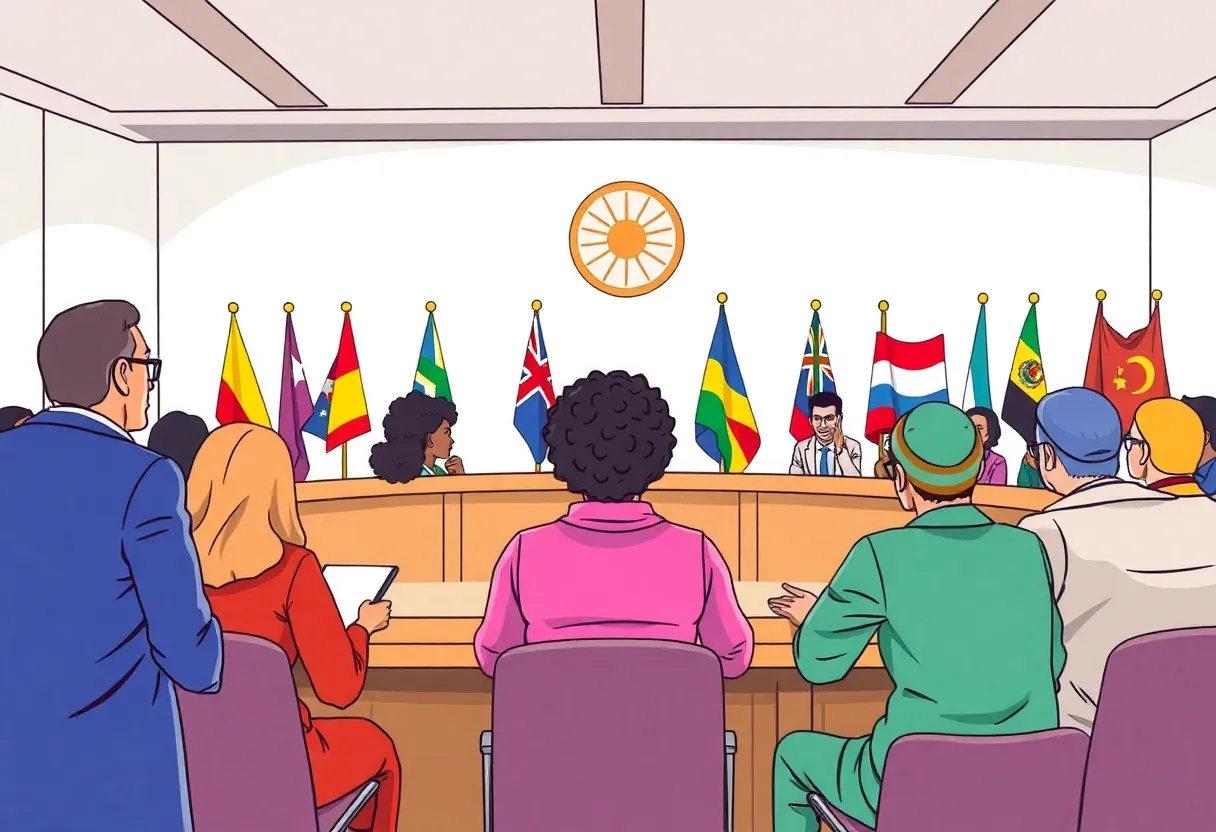News Summary
Israel has launched extensive airstrikes against Iran, targeting over 100 sites, primarily focusing on nuclear facilities and military leaders. This unprecedented military action, justified by Prime Minister Netanyahu as a response to an existential threat, has led to significant casualties among Iranian leadership and triggered retaliatory drone attacks from Iran. The situation has escalated tensions in the region, raised oil prices, and caused upheaval in international diplomatic efforts, making the potential for further conflict increasingly likely.
Israel’s Bold Airstrikes Target Iran’s Nuclear Sites
In a significant escalation of tensions, Israel carried out an extensive series of airstrikes against Iran early Friday morning. The operation involved over 200 Israeli fighter jets and targeted more than 100 sites across the country, focusing mainly on Iran’s nuclear facilities and military leaders. This unprecedented military maneuver has sent shockwaves throughout the region and raised the specter of an all-out war.
A Strategic Move or a Last Resort?
Israeli Prime Minister Benjamin Netanyahu has characterized these airstrikes as a necessary measure to thwart Iran’s ambitions of developing nuclear weapons. He views Iran’s nuclear program as an existential threat to Israel and insists that this operation was a last resort. Among the key targets of the strikes were highly strategic locations such as Iran’s primary nuclear enrichment facility at Natanz, and the operation resulted in the deaths of three influential Iranian security chiefs, including Maj. Gen. Mohammad Bagheri, the head of Iran’s armed forces.
Significant Impact on Iranian Military Leadership
The airstrikes not only disrupted Iran’s nuclear capacities but also targeted high-ranking military personnel. The death of General Hossein Salami, a prominent figure in the Islamic Revolutionary Guards Corps, has been noted as a substantial blow to Iran’s military structure. The extensive damage inflicted on military command centers and nuclear facilities has led many analysts to call this the largest military operation against Iran since the Iran-Iraq War.
Retaliation and Rising Tensions
Iran quickly reacted to the strikes, launching over 100 drones aimed at Israel, signaling a potential military escalation. Residents in Tehran reported hearing powerful explosions and witnessing smoke billowing from multiple locations as the situation grew tenser. The Iranian Supreme Leader, Ayatollah Ali Khamenei, has warned of a “harsh punishment” against Israel, suggesting that deeper ramifications could unfold in the days and weeks to come.
Global Ramifications
The aftermath of the airstrikes is being felt far beyond the borders of Israel and Iran. In financial markets, oil prices jumped by 9%, climbing to approximately $78 a barrel as concerns grew over regional instability and its potential impact on global oil supplies. The United States, while not directly involved in the strikes, has taken steps to safeguard its personnel in the region by withdrawing diplomats from Iraq and allowing military families to leave voluntarily.
International Reactions and Implications for Diplomacy
International responses have varied, with Saudi Arabia condemning the strikes as a blatant violation of international laws and norms. Countries like Australia and New Zealand have expressed alarm, calling for a focus on diplomacy and restraint. Meanwhile, Jordan has taken immediate measures by temporarily closing its airspace, reflecting the increasing risks associated with heightened regional tensions.
The Future of Nuclear Negotiations
Following the airstrikes, the Iranian government announced its decision to withdraw from upcoming nuclear negotiations scheduled in Oman, which were part of ongoing diplomatic efforts aimed at curtailing Iran’s nuclear program. This withdrawal casts a significant shadow over any future discussions and adds to the uncertainty surrounding the geopolitical landscape in the region.
A Worrying Outlook
As the dust settles from these dramatic developments, it’s clear that the situation remains precarious. Netanyahu has declared that fighting will continue “for as many days as it takes,” indicating that both sides may be bracing for a protracted conflict. The world watches with bated breath, hoping for a resolution that steers clear of further escalation and promotes peace and stability.
Deeper Dive: News & Info About This Topic
- The New York Times: Israel-Iran Nuclear Tensions
- Wikipedia: Israel–Iran Relations
- The Washington Post: Iran-Israel Nuclear Conflict
- Google Search: Israel Iran Nuclear Conflict
- CNN: Israel-Iran Strikes Live Updates
- Google Scholar: Iran Nuclear Weapons
- Al Jazeera: Trump Warns of Conflict
- Encyclopedia Britannica: Iran

Author: STAFF HERE PETERSBURG WRITER
The ST PETERSBURG STAFF WRITER represents the experienced team at HEREStPetersburg.com, your go-to source for actionable local news and information in St Petersburg, Pinellas County, and beyond. Specializing in "news you can use," we cover essential topics like product reviews for personal and business needs, local business directories, politics, real estate trends, neighborhood insights, and state news affecting the area—with deep expertise drawn from years of dedicated reporting and strong community input, including local press releases and business updates. We deliver top reporting on high-value events such as Grand Prix of St. Petersburg, Localtopia, and SHINE Mural Festival. Our coverage extends to key organizations like the St. Petersburg Area Chamber of Commerce and St. Pete Downtown Partnership, plus leading businesses in finance, manufacturing, and healthcare that power the local economy such as Raymond James Financial, Jabil, and Bayfront Health St. Petersburg. As part of the broader HERE network, including HEREJacksonville.com, HEREOrlando.com, HERETallahassee.com, and HERETampa.com, we provide comprehensive, credible insights into Florida's dynamic landscape.




